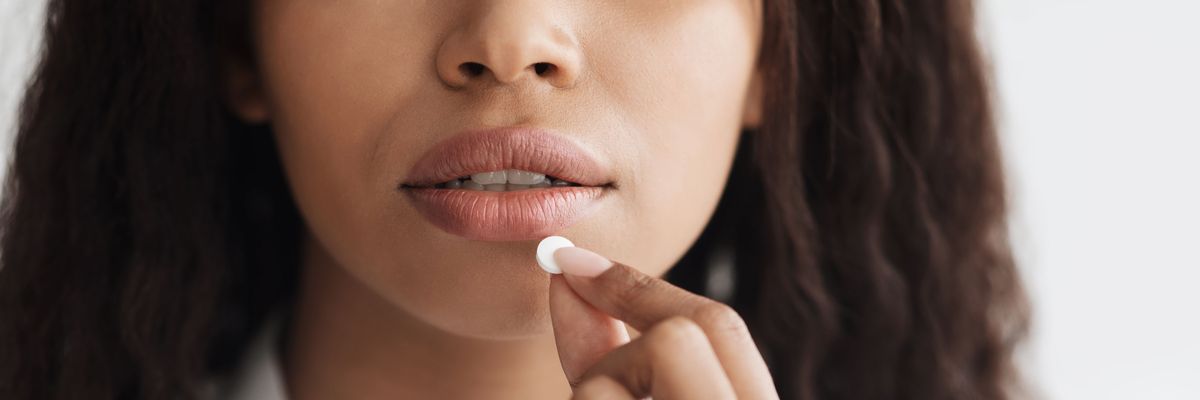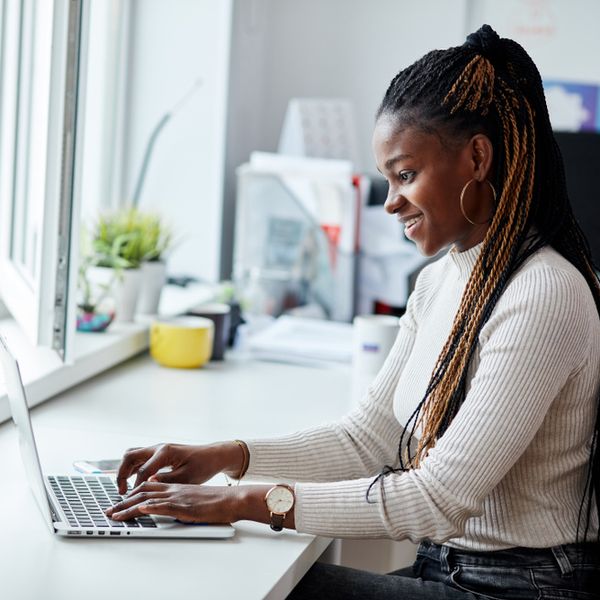
In the pilot episode of Insecure, Issa Dee's coworker at their company, We Got Y'all, hits her with one of the most random questions a person can even ask in the workplace:
"Issa, what's 'on fleek'?'"
I cackled the first time I saw this scene, mainly for the audacity, like is Issa the company's culture-whisperer or something? And in real life, you know we'd then side-eye the possible intent as in why, so y'all can use the term now?
It was a question that seemed so irrelevant and out-the-blue without any backstory that it momentarily took Issa aback. She actually had to contemplate what to say before she gave a response. Well, there's a term for what happened in that scene. What Issa experienced was a microaggression.
A few weeks ago, I signed up for The Prevailing Woman's Prevailing Through a Pandemic virtual series and one of the first sessions was on microaggressions. It was led by Ashley McGowan, a global tech and communications professional. McGowan describes microaggressions as subtle or insignificant comments and behaviors that aren't exactly offensive or straightforward but they make you feel some type of way and question the person's intent. They also come from individuals who don't look like us.
So, what other things can individuals who don't look like us do or say that can be classified as microaggressions?
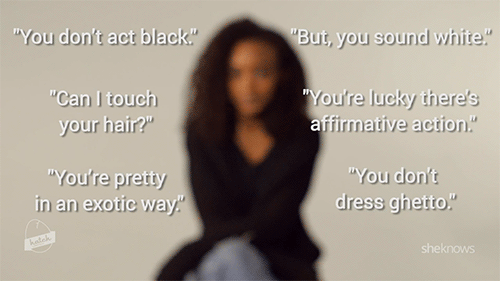
Let's say you rock a teeny-weeny 'fro and you get faux locs installed over the weekend. When you arrive at work on Monday, your co-workers approach you and ask the following questions:
How did you get that extra hair on your head?
How do you wash it?
How long are you going to keep it in there?
And then, they reach out to touch it while telling you how pretty it is.
Or, you walk past your colleague in the hallway and he greets you with 'sup, "Hey, girl!" or a fist bump.
Or, you walk into a conference room filled with typical C-suite (CEO, CFO) executives to deliver a presentation but they automatically assume you're the assistant who's there to take the minutes and help with the audiovisuals.
Or, you slay your presentation on your global call meeting and the ooooonly feedback your colleagues can offer afterwards is, "Wow, you were so articulate in delivering your strategy."
That last one actually happened to McGowan.
Author Austin Channing Brown could vouch for that type of behavior in the workplace. In her book, I'm Still Here: Black Dignity in a World Made for Whiteness, Brown writes about her experience as a black woman working in a Christian-centered organization amongst a majority-white staff. Like Issa Dee's We Got Y'all, Brown's nonprofit serves the black and brown population yet the staff doesn't exactly reflect the same demographic. And the few black women, including Brown, who are in a position of authority aren't heard unless their ideas are cosigned by the majority staff.
While Brown conducts numerous trainings on race relations, her seminar attendees are uncomfortable with the fact that a black woman is the expert on the topic. They expect to hear from a "typical" Austin: a white male. In fact, on several occasions attendees have asked her, "Who's really in charge here? I want to speak with Austin." And when they learn that she's really the Austin, they launch into screaming and spitting tantrums because now they feel dumb and duped.
If hilarious and offended had a face, they would be it.
What was particularly interesting is when Brown outlined her day from 8:55am to 5pm. She experienced 14 instances of microaggressions with the first one starting before she even reached her cubicle to begin her day. What happened? She was stopped three times in the hallway and asked if she needed help finding the outreach center. It never dawned on anyone that she was actually an employee and not a client. And she's a director at that.
Both Brown and McGowan would agree that the whole thing is exhausting. In the pandemic panel, McGowan explained how we carry the burden of feeling responsible for our colleagues' feelings. We feel we must validate their thoughts before we can contradict them. And while they get to think about their daily to-do lists in the mornings before they leave home for work, we must worry about our hairstyles, our attire or any other aspects of our being that might draw inappropriate questions.
The more important question is what can we do about it? Microaggressions aren't something that's specifically addressed in our company handbooks and we can't report them to HR as blatant racism or harassment because technically they aren't. Besides, in Brown's case, she was told, "Perhaps you misunderstood," "I'm sure he didn't mean it like that" or that she's "too sensitive" and should be more careful about what she reports. Microaggressions are simply hard to prove.
Nevertheless McGowan suggests three tips to mitigate our frustrations when it comes to microaggressions in the workplace:
Maintain our composure.
 Giphy
GiphyWe do want to respond to these actions and behaviors because allowing them to slide only invites more side comments, which ultimately affects our mental health and our productivity. But we don't want to pop off or step outside of character because we are at work and that can lead to a whole other set of workplace problems.
Be mentally aware of microaggressions.
 Giphy
GiphyWe don't need to convince ourselves that maybe we're overreacting. We know when someone's words or actions don't sit right in our spirit. The key is to understand that this weird thing that occasionally happens at work has an actual name and that microaggressions are real.
Identify safe spaces and resources.
 Giphy
GiphySince we can't always go to HR, we'll need an outlet to vent our frustrations. Connect with a mentor or peer within the industry who can relate to what you're going through. That person could be someone you know or someone you've "met" through social media networks. There are groups on this very topic. Talk to someone after the first or second offense and also be sure to document the offenses just in case they escalate. Then we'll already have solid proof to report to HR.
As much as Issa Dee stays in her head with a clapback, she delivered a simple and self-composed response to the "on fleek" question.
"I don't know what that means," Issa Dee said.
I had to applaud that one. It was subtle enough to avoid a trip to her manager's office for being unapproachable and angry (Brown got those all the time!) yet strong enough to say don't ask me no ish like that again.
But who are we kidding? Of course we're bound to get similar questions, slick comments and stereotypical approaches from our next colleague. And without any of it being an infraction covered in our employee handbooks, we're forced to tap into our own black girl power for protection.
Our only "safe" recourse may be to recognize it, process it and talk about it with our trusted peers. But we should always address it, too. Shut that ish down, sis, but diplomatically so we can keep stacking these coins and building our resumes. While the solution may not seem game-changing, it's a strategic play. So for the sake of both our sanity and jobs, the best way to handle a microaggression is with a bit of passive aggression. At least, for now.
Want more stories like this? Sign up for our newsletter here to receive our latest articles and news straight to your inbox.
Featured image by Shutterstock
Your December 2025 Monthly Horoscopes Are All About Surrender & Alignment
December is about letting go. We end the year with the need for more peace, reflection, and rejuvenation, and that is exactly what December is providing for us. The Sun is in Sagittarius, and anything is possible. This is the month to believe in that and to know that the universe is supporting you. With a Supermoon in Gemini as we begin the month as well, we have an opportunity to gain the closure we have been looking for this year and to wrap up old projects, ideas, and communication breakthroughs.
This is the month to make your peace the priority and let go of trying to control the way the tides are turning. Trust in your new beginning, and give yourself time to prepare for it this month.
A big part of the clarity that is coming through this month is due to Neptune going direct in Pisces on December 10, after being retrograde here since July. With Neptune now direct, we are able to see our inspiration and creativity a little more clearly, providing the perfect energy for dreams and manifestation to be built upon. The smoke is clearing, and it’s up to you to decide what you want to do with this newfound clarity that this transit is bringing. Mercury also moves back into Sagittarius on December 11, which is great for communication and clarity, and the adventures you were trying to see through at the beginning of November come around for you again with greater purpose and support.
On December 15, Mars enters Capricorn until the end of January 2026, and this is the extra push we need to make important changes and to be on the path towards greater abundance, stability, and prosperity. Mars in Capricorn takes care of business, and we have extra energy at our disposal during this time to do so. This transit is an ideal time to focus on your career or financial goals for next year and to start putting some of these plans into motion now. A few days later, we have the New Moon of the month, which will be in Sagittarius on December 19, and this is the perfect New Moon to manifest.
The energy is high, magic is in the air, and it’s all about moving forward with the new beginnings that are inspiring you and bringing you joy to think about right now.
Capricorn Season officially begins on December 21, and this earth sign energy is how we heal, gain closure, and build new foundations in our world. With Venus also moving into a Capricorn a few days later, there is something about peace, prosperity, and security that we are gaining in life and in love as we close out the year, and this is what we need right now. This month is about reflecting on what was, letting go of old hurt, and renewing. December is an ending and a new beginning in one, and there is magic in this space to be created.
Read for your sun and rising sign below to see what December 2025 has in store for you.
 AriesKyra Jay for xoNecole
AriesKyra Jay for xoNecoleARIES
December is a full-circle moment for you, Aries. You are seeing the gifts in your world and have a lot of gratitude for the way things have come about for you as of late. There are culminations in your world that are providing you with more abundance, stability, and community, and you are exactly where you are meant to be this month. With the Sun in a fellow fire sign and in your 9th house of travel for most of the month, December is a good time to get out of your comfort zone, explore the world around you, and get your body moving.
Mars, your ruling planet, also makes a change and moves into Capricorn on December 15, which will fuel your inspiration and power in your career space. You are making a lot of professional progress as we close out the year; however, make sure to be more mindful of your competitive drive right now. The New Moon on December 19 is the perfect opportunity for you to create some new plans and goals when it comes to traveling, education, and where you want to gain some new inspiration in your world. Overall, this is a month of things coming together for you serendipitously.
 TaurusKyra Jay for xoNecole
TaurusKyra Jay for xoNecoleTAURUS
December is about trusting your intuition, Taurus. You have a lot on your mind this month, and it’s best to delegate, communicate, and allow yourself some relief by opening up to someone and not feeling like you have to hold everything in. As we begin the month, we have a Supermoon in Gemini happening in your house of income, and the plans and projects you have been building here come to fruition for you now. This is the time to gain clarity on your financial world and to take a look at what spending habits you want to let go of here as well.
With Venus in your 8th house of shared resources for most of the month, you are doing a cleanse on your commitments, partnerships, and business ventures. You are taking a look at what you want to dedicate yourself to in the future, and what commitments you may need to let go of now in order to be in the space you truly want to be, both financially and within some of your relationship dynamics. Before we end the month, we have a New Moon in this same area of your chart, and it’s time to look at the opportunities that are presenting themselves and to trust your internal guidance system to lead you forward.
 GeminiKyra Jay for xoNecole
GeminiKyra Jay for xoNecoleGEMINI
You are moving forward fearlessly this month, Gemini. December is your month of love, passion, and dignity, and you are owning the light that you shine. We begin the month with the last Supermoon of the year, happening in your sign, and you are stepping up to the plate. You are showing up, owning how much you have grown this year, and allowing yourself to heal while also acknowledging that you have done your best and you deserve to have fun in the midst of the changes you are creating.
Mercury, your ruling planet, is officially out of retrograde, and you can use this energy to the fullest potential now. With Mercury in your 7th house of love, it’s time to speak from the heart and to talk about the things that matter and that are inspiring you right now to your loved ones. You never know what kind of epiphanies you may have when you open up the conversation to others. Before the month ends, you have a New Moon in this same love area of your chart, and this New Moon is all about manifesting romance, commitment, and abundance in your world.
 CancerKyra Jay for xoNecole
CancerKyra Jay for xoNecoleCANCER
December is an opening for more love, more joy, and more freedom in your life, Cancer. You have come to a place where you hold so much gratitude in your heart for where you are today and where your heart is shining, and things come together for you with more ease right now. With the Sun in your 6th house of health, work, and daily routines for most of the month, you are getting your ducks in a row while also putting more energy and effort into taking care of yourself, your priorities, and your well-being. This month surprises you in many ways, and it’s because you are showing up.
Mars and Venus both move into your house of love, relationships, marriage, and abundance this month, and you are making strides in your love life. You have both of these opposing forces on your side and are being recognized for the love you are while also receiving the love you want. This month, overall, is about focusing more on the positives in your world and letting your heart have its joy. Before December comes to an end, there is a New Moon in Sagittarius, and this is the perfect opportunity to create the plans you want to see through next year, especially when it comes to your work life, colleagues, business ventures, and health.
 LeoKyra Jay for xoNecole
LeoKyra Jay for xoNecoleLEO
The scales of karma are balancing, and they are balancing in your favor this month, Leo. December is your month of truth, and of seeing it clearly in your world. The Sun is in your house of romance, pleasure, and happiness for most of the month, and it’s time to relax, be in the present moment, and allow what is meant to be, to be. With a Supermoon in your 11th house of manifestation as December begins, this is a powerful month for seeing your dreams come to fruition, and for feeling like the intentions you have set this year are finally here for you now.
Mars also moves into your 6th house mid-month, and this is the perfect energy to have to move into the new year. You have extra energy at your disposal right now and are feeling fearless with what is possible for you and your daily routine. Before the month ends, we also have a New Moon in a fellow fire sign, Sagittarius, and this is a breakthrough moment for you and your heart. December, overall, wants to show you how loved and supported you are and will be doing so in magical, unexpected, and concrete ways.
 VirgoKyra Jay for xoNecole
VirgoKyra Jay for xoNecoleVIRGO
December is a month of victory, Virgo. You are showing up and experiencing some new successes in your world that move you forward on your path in life. With a Supermoon in your 10th house of career as we begin the month, the effort and intentions you have made this year come into full bloom, and you are being recognized for who you are and the good work you have done. This month is all about showing up and allowing yourself to be seen and loved, knowing that you deserve the support and opportunities you are receiving.
Mars moves into Capricorn on December 15, which brings the passion and excitement into your love life, hobbies, and little pleasures in life that light you up. You want to have fun this month and are going to be walking into the new year with this fearless, happy, and spontaneous energy within you. Before the month ends, Venus also enters Capricorn, and in this same area of your chart, you have a lot to look forward to and believe in right now. Overall, December wants you to be happy and will be doing everything possible to make that happen for you. This is your month to shine, Virgo.
 LibraKyra Jay for xoNecole
LibraKyra Jay for xoNecoleLIBRA
December is a month of opportunity for you, Libra. New doors open, and you are financially making breakthroughs this month because of it. December begins with a Supermoon in your 9th house, and you are getting a clearer view of where you have been making strides in your life and how it has all brought you here to this present moment of freedom. This month is showing you what happens when you are fearless with your purpose and when you believe in yourself and what you are worthy of.
Moving further into December, Mars moves into your 4th house of home and family mid-month, and you are closing out the year in your safe spaces. You are spending more time with your loved ones and taking the time to quiet your mind and listen to what your heart has been telling you. Before the month ends, we have a New Moon in Sagittarius, happening in an area of your life that deals with communication. This is a great time for getting the answers you have been looking for and for feeling more clear-headed and confident about the decisions you are making as you move into the new year.
 ScorpioKyra Jay for xoNecole
ScorpioKyra Jay for xoNecoleSCORPIO
Patience is a virtue this month, Scorpio. December is all about remaining patient and vigilant with what you are creating in your world, and knowing that the universe has your back. It’s time to be reminded of the power of hope, and this month is an opening to greater clarity in your life. There is a lot of energy in your financial zones right now, and this is providing you with new opportunities and new insight; however, the speed at which things come about for you may feel daunting. Keep your head up and eyes focused on what you want and know that you are more than worthy of receiving it.
With Mercury in your 2nd house of income this month, December is a good time to plant new seeds and to think about where you want to be financially a month from now or even a year. This month is asking you to think bigger and to think more long-term so that you can set the appropriate plans into motion now. We also have a New Moon in your house of income before the month ends, and this is when you will see more of your dreams come to fruition in this area of your life, and have more opportunities to build. Overall, December will be teaching you a lot, Scorpio.
 SagittariusKyra Jay for xoNecole
SagittariusKyra Jay for xoNecoleSAGITTARIUS
Sagittarius Season is here, and there is a lot in store for you this month, Sag. December is all about what you are dedicating yourself to. It’s about setting your intentions and putting the work in to back up your dreams, and about getting things in order so that when the new beginnings come, you are ready for them. The Sun and Venus are in your sign for most of this month, and there are a lot of eyes on you right now. You have the potential to create a new beginning for yourself, and it’s time to invest in yourself, your love life, and your dreams.
Mercury moves into Sagittarius on December 11, and this is giving you another opportunity to see through some of the plans that you had initiated in November. Mercury was retrograde in your sign last month, and there may have been some disruptions to your vision and plans for the future, and now this energy is turning around for you. Before the month ends, we also have a New Moon in Sagittarius, and you are walking through new doors fearlessly. You are catching others by surprise by your growth this month, and you are thinking a lot about your purpose, future, and plans for the new year.
 CapricornKyra Jay for xoNecole
CapricornKyra Jay for xoNecoleCAPRICORN
December is all about the vision, Capricorn. You are moving through a lot of changes and transformations this month, yet they are giving you a chance at a new beginning in the process. You are focused more on the future and what goals you want to manifest for yourself right now, and are ready to let go of what hasn’t been working for you. With the Sun in your 12th house of closure for most of December, this is your time for healing, but remember, healing doesn’t have to be isolating or boring; you can thrive while you renew, and you are this month.
Mid-month, the excitement picks up for you, and you are feeling more energized than you have in a while. Mars moves into Capricorn until the end of January 2026, and you are being proactive with your goals, intentions, and passions. You are a force to be reckoned with this month, and you are making things happen for yourself with confidence. Capricorn Season officially begins on December 21 this year, and this is definitely speeding up your healing process. You are breaking free from what was, and with Venus also moving into Capricorn before the month ends, you are leaving this year in high spirits and with love opening a new door for you.
 AquariusKyra Jay for xoNecole
AquariusKyra Jay for xoNecoleAQUARIUS
December is all about community, creativity, and manifestation, Aquarius. This is the month to work together with others to help bring your dreams to life. You are in a space of inspiration, empowerment, and beauty, and are creating more of this energy around you and in your world. Look out for what support comes your way this month and know that you don’t have to do everything alone to succeed. With the Sun in your 11th house of manifestation and friendship, your intentions are coming to fruition, and it’s time to celebrate with the people you love and to own how far you have come this year.
On December 19, we have a New Moon in Sagittarius, lighting up your life in all of the best ways possible. This is your New Moon of freedom, victory, and magic, and you are seeing new beginnings appear that you were once just hoping for. Before the month comes to an end, Venus moves into your 12th house of closure, and after an active and successful month, you are ready to relax, heal, and give your heart some of the attention it has been asking for. You are moving into the new year with the need to release and renew what hasn’t been working in your relationships, and you are finally ready to.
 PiscesKyra Jay for xoNecole
PiscesKyra Jay for xoNecolePISCES
December is a big month for you, Pisces. You are making some huge accomplishments this month, and are feeling like everything you have been through this year has been worth it for these moments that are coming to fruition for you now. The Sun is in your 10th house of career and reputation for most of the month, and this is where a lot of your focus is right now. You are claiming your successes and putting yourself out there in ways that not only serve you, but that inspire others as well.
Neptune officially goes direct on December 10, after being retrograde in your sign since July, and you are finally seeing things a little more clearly. You are feeling renewed inspiration and passion in your life, and your intuition is your strongest asset right now. Before December comes to an end, we also have a New Moon in your 10th house of career, and what happens now not only changes things for you in the present, but it also opens new doors and what is possible for you in the new year as well. Overall, you are on top of your game this month and are owning the joy and empowerment you feel.
Featured image by Kyra Jay for xoNecole
I already know that this one is gonna hurt a few feelings. The reason why I say that is because, if there is one thing that (many) folks are going to take if they are looking to get a good night’s rest, it’s melatonin, chile.
How do I know? Well, aside from the fact that some people in my own world are hooked on it, it’s also been reported that as many as 27 percent of Americans rely on this particular supplement to catch themselves some nightly zzz’s. That’s why, when I peeped that a particular study about melatonin was damn near viral, I decided that I absolutely needed to use my side of cyberspace to get the word out.
You see the title of this piece. Unfortunately, it is not an exaggeration. If you give me a moment, I will try to explain what is going on and how you should move, going forward, if melatonin is something that you have been relying on in order to get a good night’s rest.
What Is Melatonin?
 Giphy
GiphyOkay, so what exactly is melatonin? It’s actually a hormone in your system that your body produces in order to regulate your circadian rhythm/sleep cycle. Since melatonin tends to kick in 1-3 hours before you turn in at night, that is actually why “losing an hour” (of sunlight) during this time of the year (check out “Is The Drama Of The One-Hour Time Change All In Your Head?”) can throw off your sleep patterns a bit.
If your body doesn’t seem to have enough melatonin naturally, you might find yourself taking a melatonin supplement in order to increase your melatonin levels, although it should go on record that melatonin is also used to treat seasonal depression; a form of reflux disease (GERD); migraines and headaches; fibromyalgia, and even certain types of anxiety. Melatonin also has a reputation for helping to regulate menstrual cycles and slow down the aging of skin and hair. Something else to keep in mind? When melatonin is in supplement form, oftentimes, it is synthetic, which means that it is made in a lab.
Okay, so clearly, melatonin is needed and, as a supplement, it has its benefits.
Then there is the other side of the story. One that just recently came out.
Why Is the Supplement Currently a Cause for Alarm?
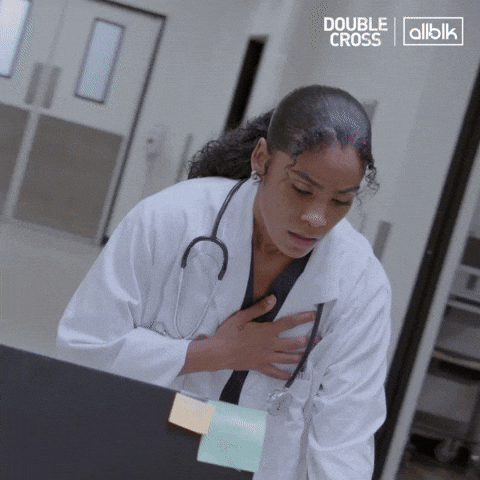 Giphy
GiphyGeeze. There really is no telling how many times I have shared one of my all-time favorite quotes in my content here: “The excess of a virtue is a vice.” Aristotle is the author and it is so very true — including when it comes to melatonin usage. Because here’s the deal: If you are relying on a melatonin supplement to get some sleep, it’s important to note that most health experts say that you shouldn’t take it for more than 1-2 months, tops.
One reason is because melatonin shouldn’t be a “solution” to your sleep problems, so if you can’t get rest without it after several weeks, it really is time to see your doctor. Another reason is because melatonin supplements do have some potential side effects including nausea, vomiting, irritability, restlessness and disorientation. And then there is what has recently come out about it: the possibility of heart failure and even death.
Wild, right? Here’s the deal about that. Did you know that, according to the American Medical Association, the FDA doesn’t regulate most supplements? So, in the case of melatonin, specifically, while one brand might contain a certain amount of it, another may have a ton more. And when someone uses melatonin, consistently, for 12 months or more, they put themselves at a whopping 90 percent increase of heart failure over those who don’t take the supplement at all (the same goes for individuals who have two melatonin prescriptions filled within 90 days of each other vs. those who don’t). Something else to keep in mind? People (involved in the study) who took melatonin were 3.5 times more likely to be hospitalized for heart failure than those who don’t use the supplement too.
Since this is relatively new research, experts are trying to get to the root of why all of this is the case; however, one cardiologist did say that sometimes insomnia itself is the result of an underlying health issue; sometimes one that has to do with one’s heart. So, taking melatonin might further mask a health problem that needs to be immediately addressed. Sleep apnea is one that he mentioned.
These are pretty alarming results, no doubt. Now does this mean that you should avoid melatonin like the plague altogether? Eh. It’s more like you shouldn’t be using it for more than a couple of months. You should talk to your doctor if you are “treating” your sleep issues with it. And it’s always best to find more natural approaches to getting things that you need into your body. When it comes to melatonin, specifically, I’ve got a few ideas.
Other Ways to Get More Melatonin into Your System
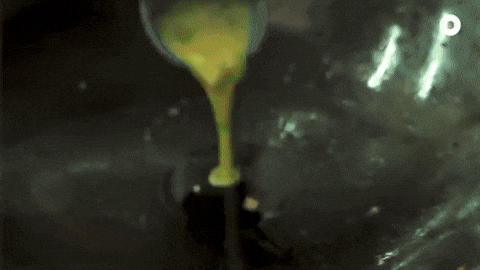 Giphy
GiphyOkay, so what are some other approaches to getting melatonin into your body?
Eat foods that are high in melatonin. Some of them include almonds, fish, milk (which is why a cup of warm milk tends to help), mushrooms, grapes, pineapples and eggs.
Stay in the light as much as possible during the daytime. Something that I like is for it to be rainy, dark and cold (whatever haters — LOL). That’s why I had to adjust the twinkle lights in my living room during the daytime because your natural melatonin levels react to darkness. So, if you’re in the dark all day, that can have your levels all over the place come nightfall.
Make sure that your room is hella dark. Remember what I just said about darkness? Well, even dim light can suppress your melatonin levels. This includes your phone’s screen, okay? So, when it’s time to go to sleep — the darker your room is, the absolute better.
Go easy on the java. It doesn’t really make sense to drink coffee at night since it’s a stimulant; however, even if it’s your jam throughout the day, 1-3 cups should be your limit and definitely earlier in the daytime. The reason? Some studies reveal that caffeine has a way of lowering your natural melatonin levels.
Have more sex. I don’t know too many people who don’t have a GREAT night’s sleep after sex. One reason why is because certain hormones within the body increase during the act; one of them is — yep, you guessed it — melatonin.
5 Other All-Natural Sleep Supplements to Consider
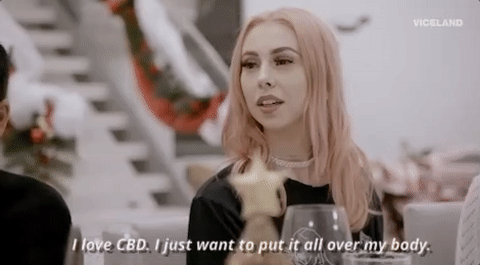 Giphy
GiphySo, now that we’ve unpacked the current issue with melatonin supplements, if you’re wondering if there are any other sleep-based alternatives for you to consider, the answer is “yes” and here are a few of ‘em.
1. Magnesium. Something that I am forever going to be a fan of is the combination of magnesium, calcium and zinc. All work together really well to calm your nerves, so that you can sleep more soundly. When it comes to magnesium, specifically, it helps to regulate your natural melatonin levels while also relaxing your muscles, so that the quality of your sleep improves.
2. Vitamin D. Vitamin D makes the list because there are studies which say that vitamin D deficiencies are linked to certain sleep disorders. This makes sense when you factor in that vitamin D helps to create natural melatonin, it helps to keep your circadian rhythm where it needs to be and it also reduces bodily inflammation (which can also affect sleep patterns).
3. CBD Oil. Although the FDA doesn’t (currently) consider CBD oil to be a supplement, it tends to be marketed as one which is why it also made the list. Since cannabidiol (CBD) is widely used for to bring relief to pain and anxiety, that is why many enjoy using it as a sleep agent as well.
4. Roman and German Chamomile. Did you know that there are different forms of chamomile? Well, the ones that help with sleep (most) are Roman and German. That’s because both contain a flavonoid called apigenin that has a sedative effect to it. When it comes to this suggestion, individuals oftentimes prefer it in tea form.
5. Glycine. If you’ve never heard of glycine before, it’s an amino acid. When it comes to sleeping, a lot of people like it because it’s been proven to help you fall asleep faster, it soothes your muscles and joints and it also helps you to stay asleep once you fall asleep.
____
I know that reading something like this can potentially freak you out. Again, if you’re not downing melatonin like candy and you’re not on it for months and months at a time, you should be fine. If you are on edge, hit up your doctor; they will be happy to explain things further and deeper, I’m sure.
In the meantime, if melatonin is your thing — moderation, please.
After all, the supplement was supposed to be a temporary “fix.” Never a permanent cure.
Which is really what the study is reminding us of.
Let’s make things inbox official! Sign up for the xoNecole newsletter for love, wellness, career, and exclusive content delivered straight to your inbox.
Featured image by Shutterstock









